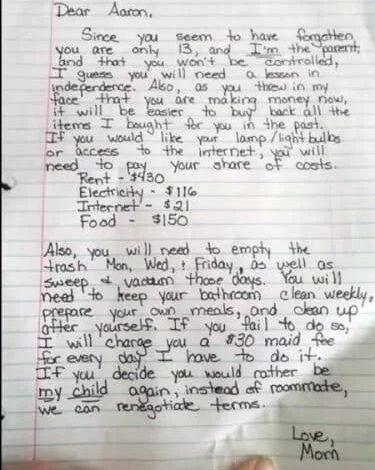Tough Love or Life Lessons? A Mother’s Letter to Her Teenage Son Sparks Debate

Tough Love or Life Lessons? A Mother’s Letter to Her Teenage Son Sparks Debate
Introduction
Parenting is a journey filled with love, challenges, and countless decisions that shape a child’s future. Sometimes, these decisions involve tough love—teaching children important life lessons in ways that might seem harsh but are intended to prepare them for the realities of adulthood. A recent viral letter from a mother to her 13-year-old son, Aaron, has sparked widespread discussion about the balance between discipline and nurturing in parenting.
The Letter: A Wake-Up Call
The letter, handwritten on lined paper, starts with the mother addressing her son’s apparent desire for independence and resistance to parental control. She reminds him that, at 13 years old, he is still a child under her care, but she is willing to give him a taste of the independence he seems to crave. The mother outlines a list of expenses that Aaron will need to cover if he truly wishes to live without her guidance, including rent, electricity, internet, and food, totaling $430. Additionally, she sets expectations for household chores such as taking out the trash, vacuuming, and cleaning his bathroom. Failure to fulfill these responsibilities, she warns, will result in a $30 maid fee for each day he neglects his duties.
Parenting in the Modern Age
The letter quickly went viral, with reactions ranging from applause for the mother’s approach to concern that the message might be too harsh for a 13-year-old. In an era where parenting styles vary widely—from helicopter parenting to free-range parenting—this letter raises questions about how best to prepare children for the responsibilities of adulthood. Is this form of tough love effective in teaching financial literacy and responsibility, or does it risk alienating the child and creating unnecessary stress?
The Importance of Life Skills
One thing is clear: the mother’s intent is to teach her son valuable life skills. Understanding the cost of living, learning how to manage money, and taking responsibility for one’s environment are essential skills that many young people only learn when they are thrust into adulthood. By simulating these real-world responsibilities in a controlled environment, the mother aims to give her son a glimpse of what independence truly entails.
Balancing Discipline and Support
However, the letter also highlights the delicate balance parents must strike between discipline and support. While it’s important for children to learn that their actions have consequences, it’s equally important for them to feel supported and loved. The tone of the letter, while firm, leaves room for reconciliation. The mother clearly states that if Aaron decides he would rather be her child than her roommate, they can renegotiate the terms—indicating that this exercise is not about punishment, but about growth and understanding.
Public Reaction: A Divided Opinion
Public reaction to the letter has been mixed. Some applaud the mother for her no-nonsense approach, seeing it as a necessary antidote to the entitlement they perceive in today’s youth. Others worry that the letter might damage the relationship between mother and son, arguing that such lessons can be taught in more collaborative ways. This debate reflects the broader societal discussion about how best to raise children in a complex, rapidly changing world.
Conclusion
The letter from a mother to her teenage son serves as a powerful reminder of the challenges of parenting. It illustrates the need to prepare children for the realities of adult life while maintaining a nurturing relationship. Whether one agrees with the method or not, the letter has succeeded in sparking important conversations about responsibility, independence, and the role of parents in guiding their children toward maturity. Ultimately, the effectiveness of such an approach depends on the individual child and the overall dynamic of the parent-child relationship. In the end, parenting is about finding the right balance—teaching life’s tough lessons while also providing the love and support that every child needs.




